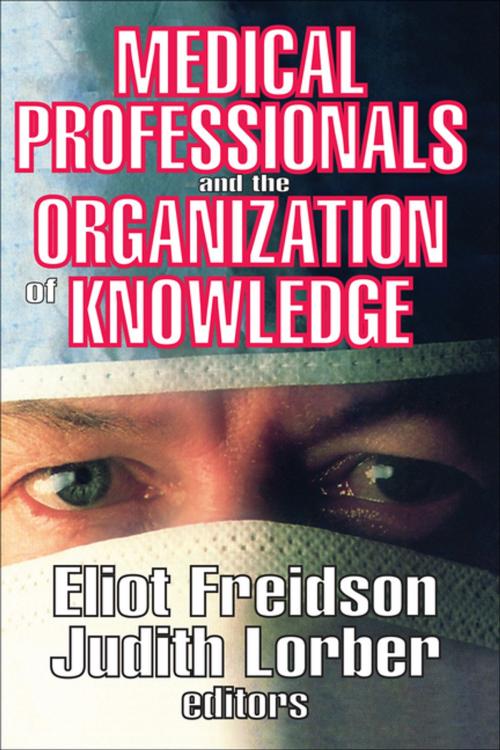Medical Professionals and the Organization of Knowledge
Nonfiction, Health & Well Being, Medical, Patient Care, Health Care Delivery, Social & Cultural Studies, Social Science, Sociology| Author: | Eliot Freidson, Judith Lorber | ISBN: | 9781351506229 |
| Publisher: | Taylor and Francis | Publication: | July 12, 2017 |
| Imprint: | Routledge | Language: | English |
| Author: | Eliot Freidson, Judith Lorber |
| ISBN: | 9781351506229 |
| Publisher: | Taylor and Francis |
| Publication: | July 12, 2017 |
| Imprint: | Routledge |
| Language: | English |
"Medical Professionals and Their Work" conveys how medical people shape and organize the knowledge, perception, and experience of illness, as well as the substance of illness behavior, its management, and treatment. It is now well established that the unique symbolic equipment of the human animal is intimately connected with the functioning of the body. Freidson and Lorber believe that the proper understanding of specifically human rather than generally "animal" illness requires careful and systematic study of the social meanings surrounding illness.The content of social meanings varies from culture to culture and from one historical period to another. As important as the content of those social meanings, is the organization of groups who serve as carriers and, sometimes, creators. In the case of illness, a critical difference exists between those considered to be competent to diagnose and treat the sick and those excluded from this special privilege - a separation as old as the shaman or medicine-man. Such differences become solidified when the expert healer becomes a member of an organized, full-time occupation, sustained in monopoly over the work of diagnosis and treatment by the force of the state, and invested with the authority to make official designation of the social meanings to be ascribed to physical states.The medical profession in advanced nations is in a vise between professional needs and political demands. Its organization and its knowledge establish many of the conditions for being recognizably and legitimately ill, and the professional controls many of the circumstances of treatment. It thus plays a central role in shaping the experience of being ill. With this fact of modern life in mind, this collection on the character of experts or professionals in general and of medicine as a profession in particular is uniquely fashioned.
"Medical Professionals and Their Work" conveys how medical people shape and organize the knowledge, perception, and experience of illness, as well as the substance of illness behavior, its management, and treatment. It is now well established that the unique symbolic equipment of the human animal is intimately connected with the functioning of the body. Freidson and Lorber believe that the proper understanding of specifically human rather than generally "animal" illness requires careful and systematic study of the social meanings surrounding illness.The content of social meanings varies from culture to culture and from one historical period to another. As important as the content of those social meanings, is the organization of groups who serve as carriers and, sometimes, creators. In the case of illness, a critical difference exists between those considered to be competent to diagnose and treat the sick and those excluded from this special privilege - a separation as old as the shaman or medicine-man. Such differences become solidified when the expert healer becomes a member of an organized, full-time occupation, sustained in monopoly over the work of diagnosis and treatment by the force of the state, and invested with the authority to make official designation of the social meanings to be ascribed to physical states.The medical profession in advanced nations is in a vise between professional needs and political demands. Its organization and its knowledge establish many of the conditions for being recognizably and legitimately ill, and the professional controls many of the circumstances of treatment. It thus plays a central role in shaping the experience of being ill. With this fact of modern life in mind, this collection on the character of experts or professionals in general and of medicine as a profession in particular is uniquely fashioned.















